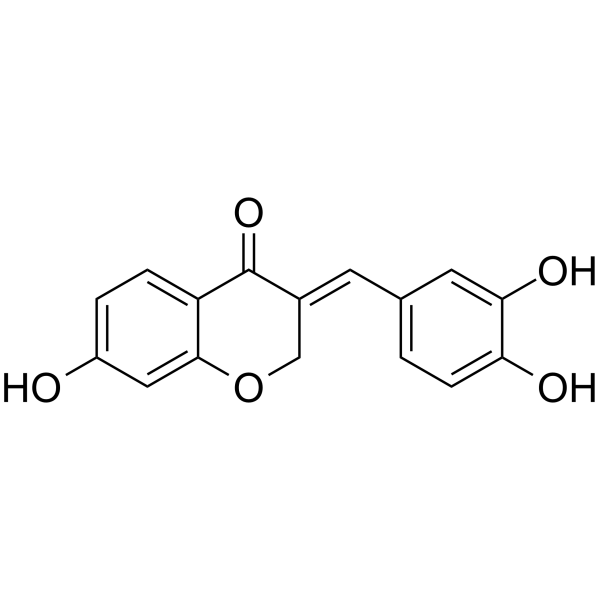
Sappanone A
CAS No. 102067-84-5
Sappanone A( —— )
Catalog No. M31176 CAS No. 102067-84-5
Sappanone A is the first homoisoflavanone to be discovered with melanogenesis inhibitory activity. It exerts its anti-inflammatory effect by modulating the Nrf2 and NF-?oB pathways, and may be a valuable compound to prevent or treat inflammatory diseases.
Purity : >98% (HPLC)
 COA
COA
 Datasheet
Datasheet
 HNMR
HNMR
 HPLC
HPLC
 MSDS
MSDS
 Handing Instructions
Handing Instructions
| Size | Price / USD | Stock | Quantity |
| 50MG | Get Quote | In Stock |


|
| 100MG | Get Quote | In Stock |


|
Biological Information
-
Product NameSappanone A
-
NoteResearch use only, not for human use.
-
Brief DescriptionSappanone A is the first homoisoflavanone to be discovered with melanogenesis inhibitory activity. It exerts its anti-inflammatory effect by modulating the Nrf2 and NF-?oB pathways, and may be a valuable compound to prevent or treat inflammatory diseases.
-
DescriptionSappanone A is the first homoisoflavanone to be discovered with melanogenesis inhibitory activity. It exerts its anti-inflammatory effect by modulating the Nrf2 and NF-?oB pathways, and may be a valuable compound to prevent or treat inflammatory diseases.
-
In Vitro——
-
In Vivo——
-
Synonyms——
-
PathwayOthers
-
TargetOther Targets
-
Recptor——
-
Research Area——
-
Indication——
Chemical Information
-
CAS Number102067-84-5
-
Formula Weight284.3
-
Molecular FormulaC16H12O5
-
Purity>98% (HPLC)
-
SolubilityIn Vitro:?DMSO : 125 mg/mL (439.74 mM)
-
SMILES——
-
Chemical Name——
Shipping & Storage Information
-
Storage(-20℃)
-
ShippingWith Ice Pack
-
Stability≥ 2 years
Reference
molnova catalog



related products
-
Ezatiostat hydrochlo...
Ezatiostat hydrochloride is an effective inhibitor of glutathione S-transferase. Ezatiostat hydrochloride is a novel glutathione analog and the potential treatment of cytopenias.
-
Gly-Phe-Arg
Gly-Phe-Arg is a superpotent synthetic tripeptide mimics of the mud-crab pumping pheromone.
-
2-O-Methylphloretin ...
The peels of apple.



 Cart
Cart
 sales@molnova.com
sales@molnova.com


